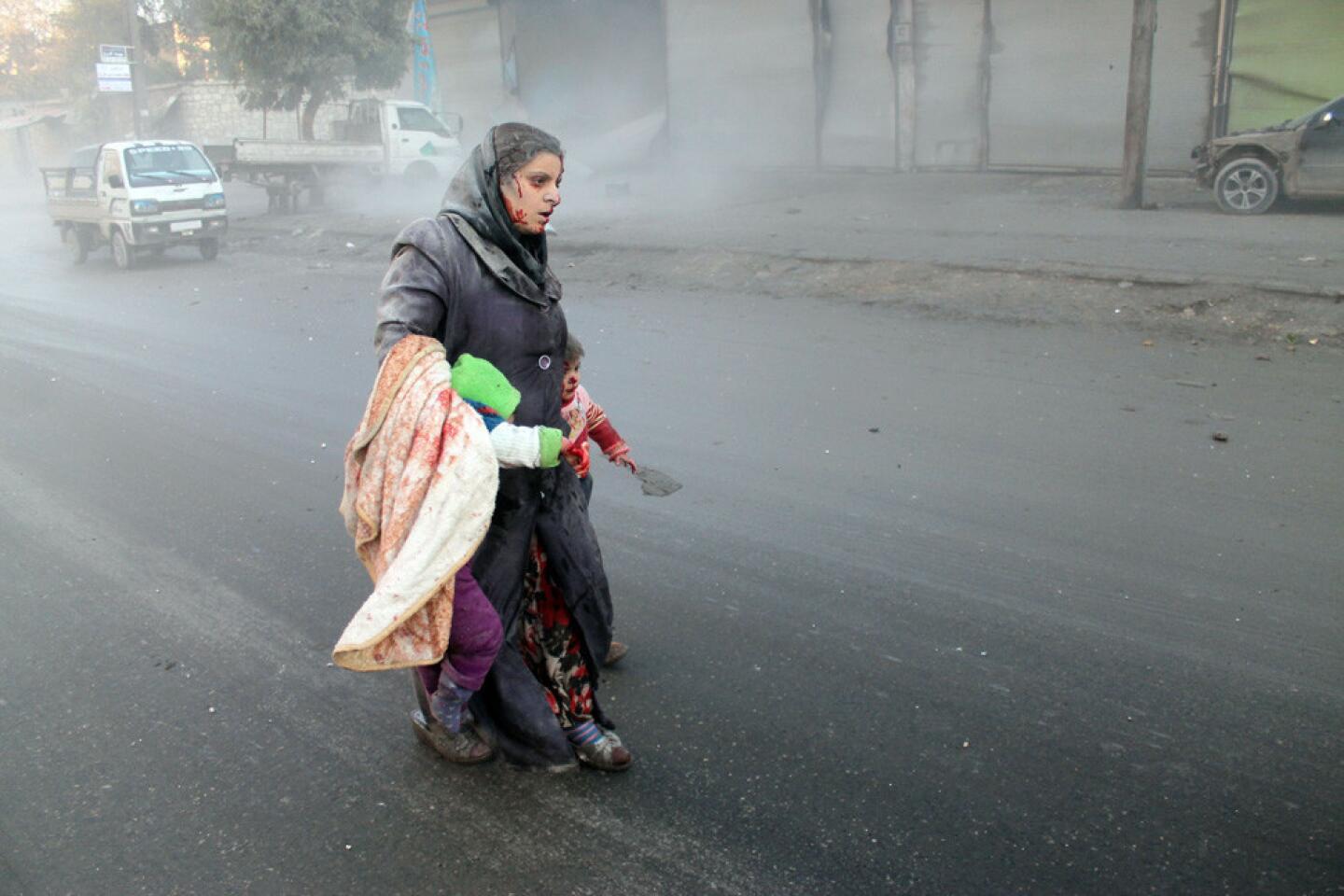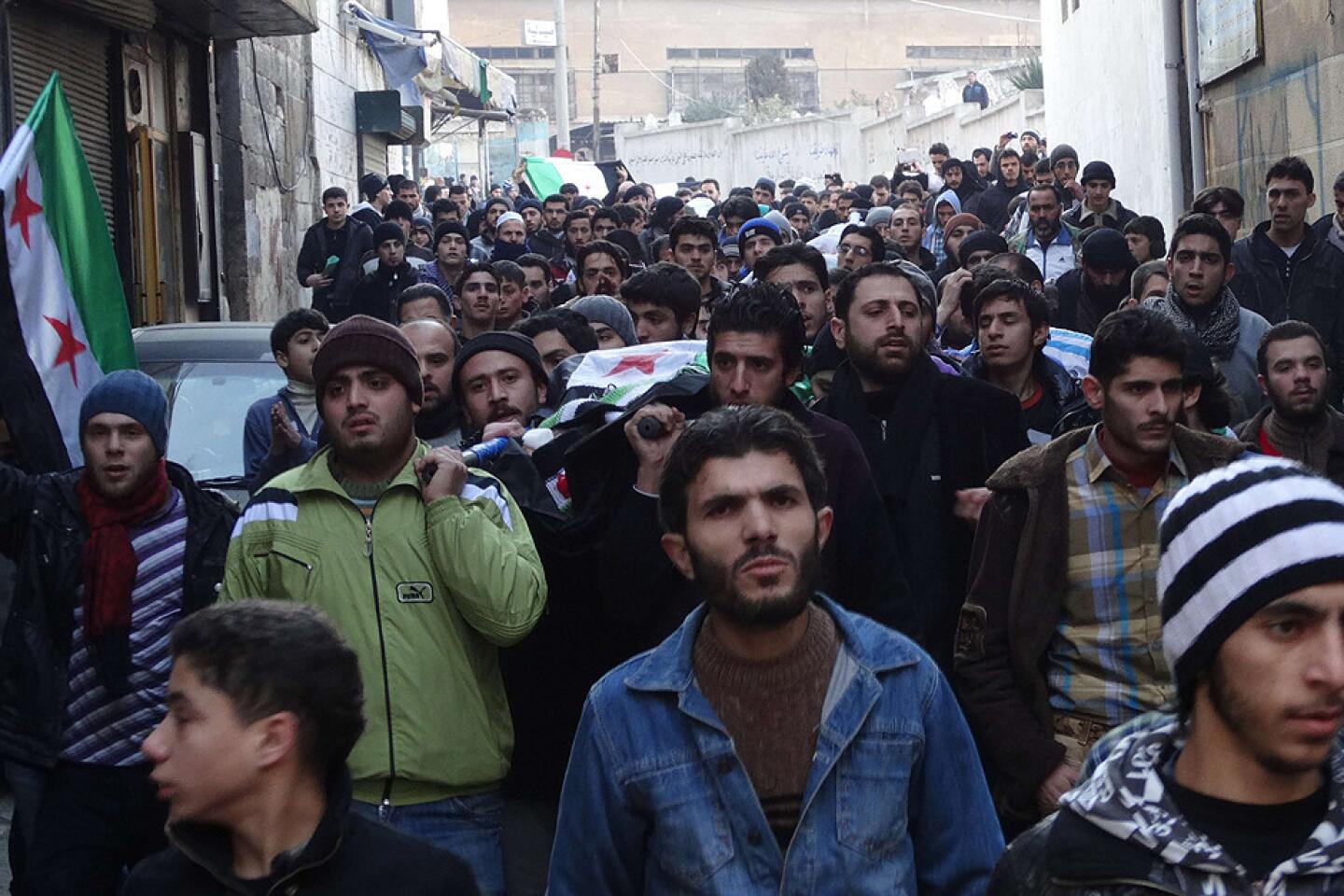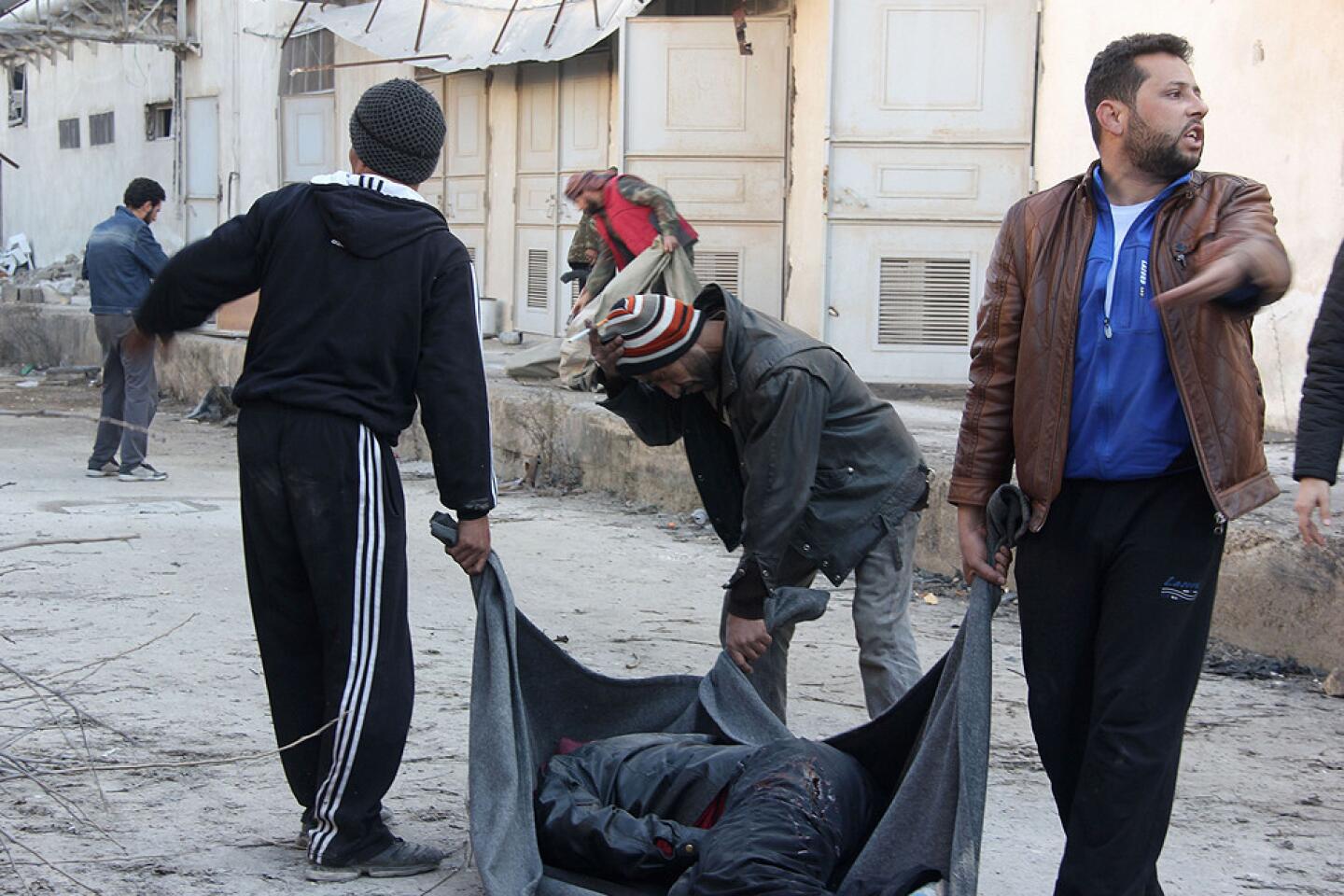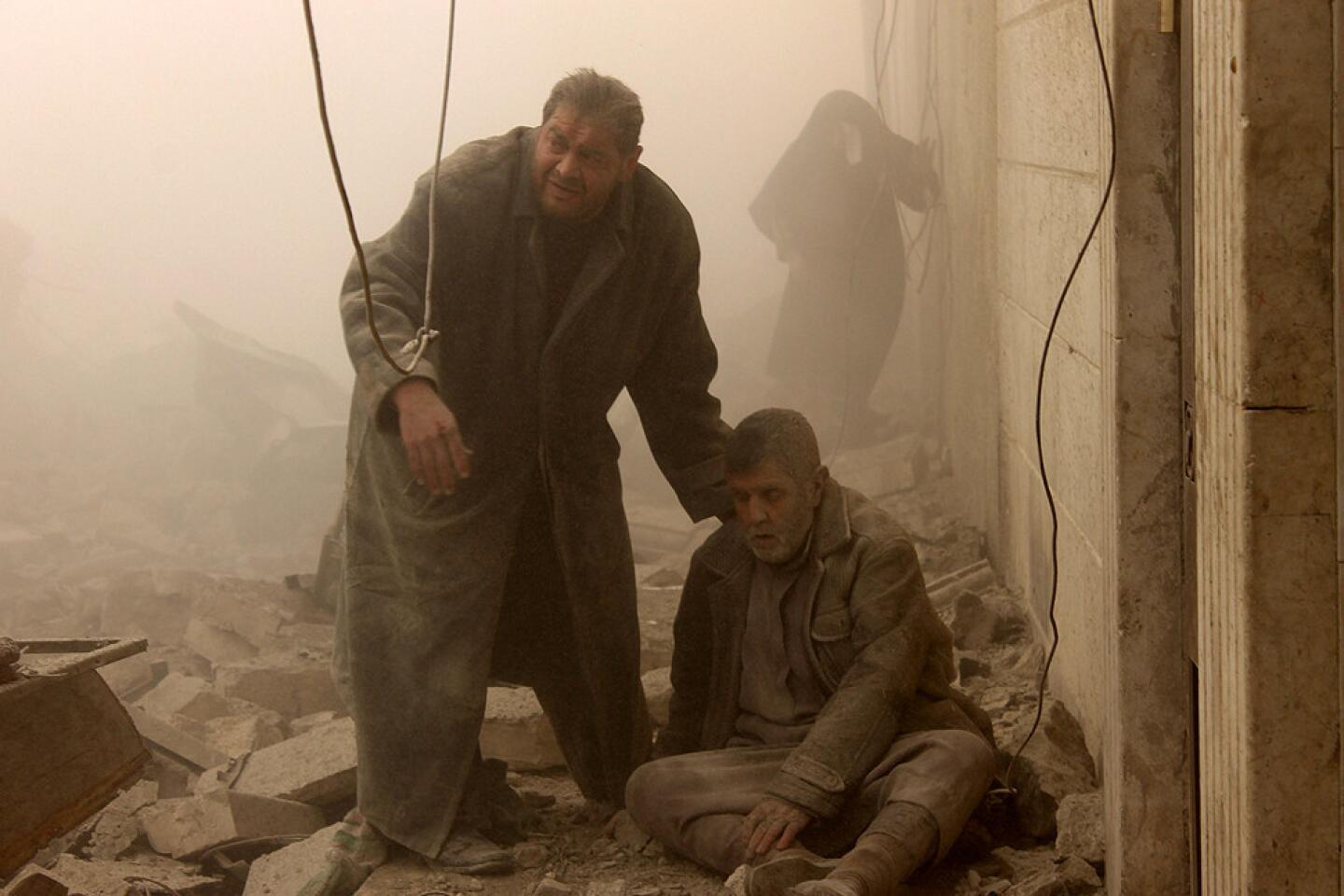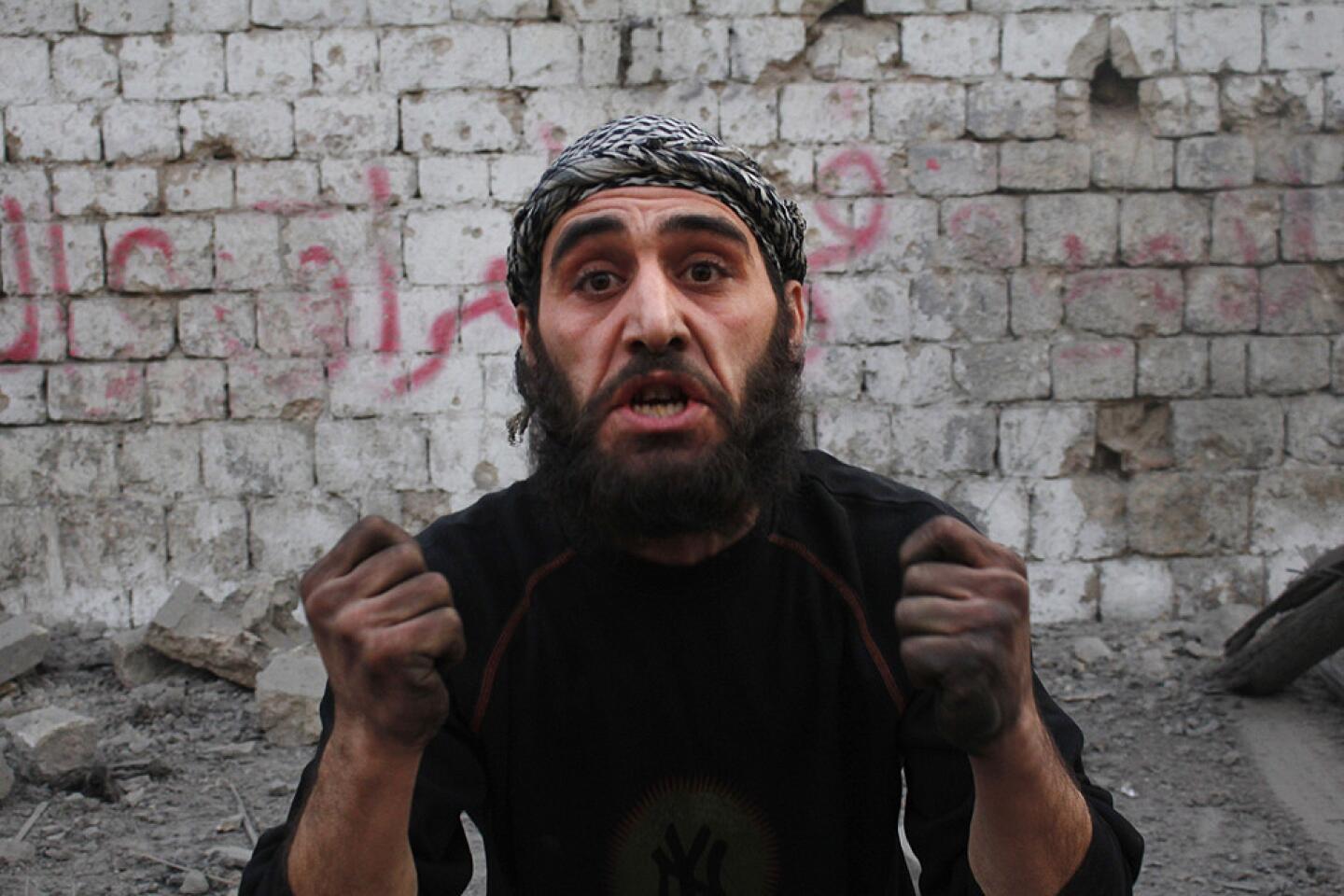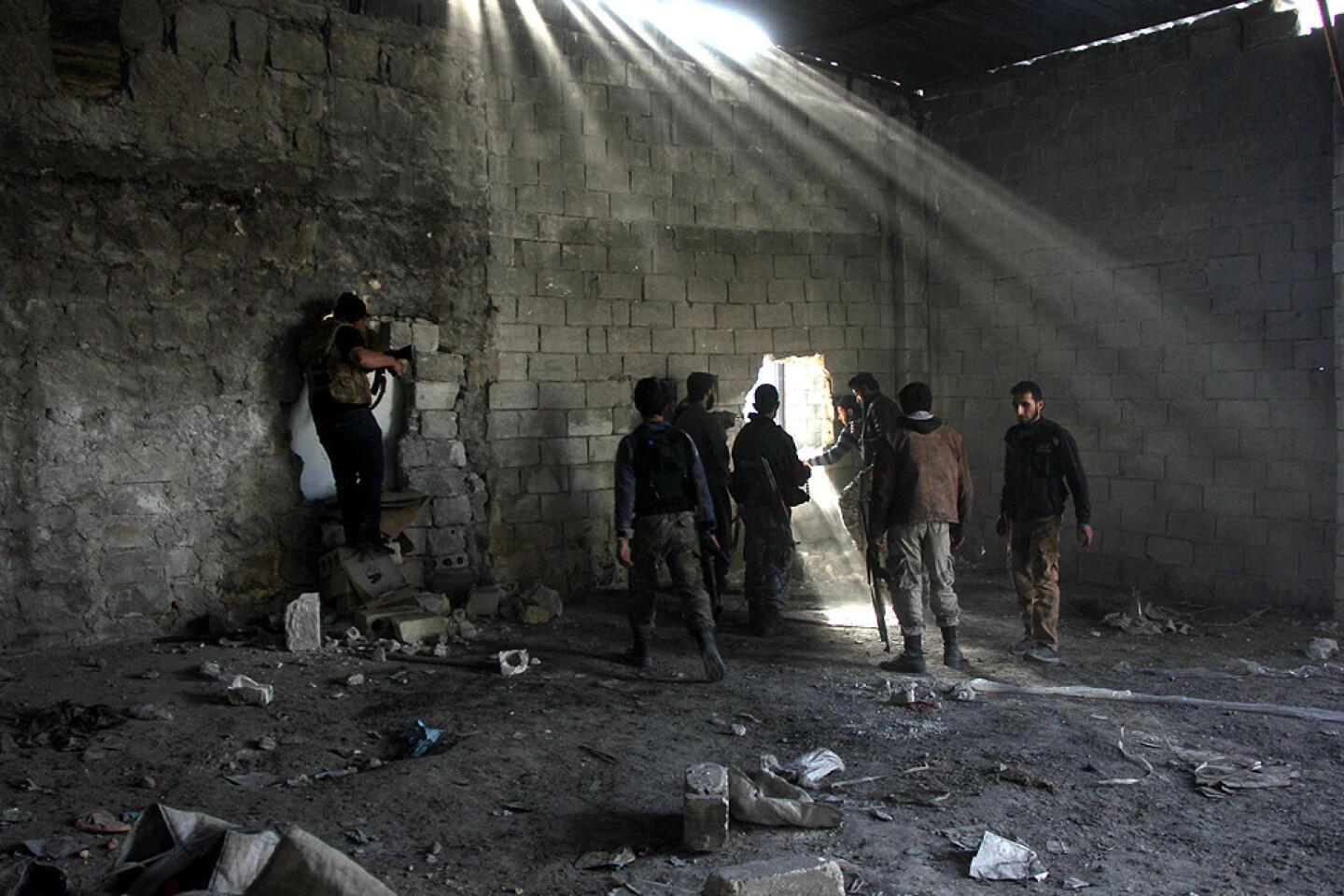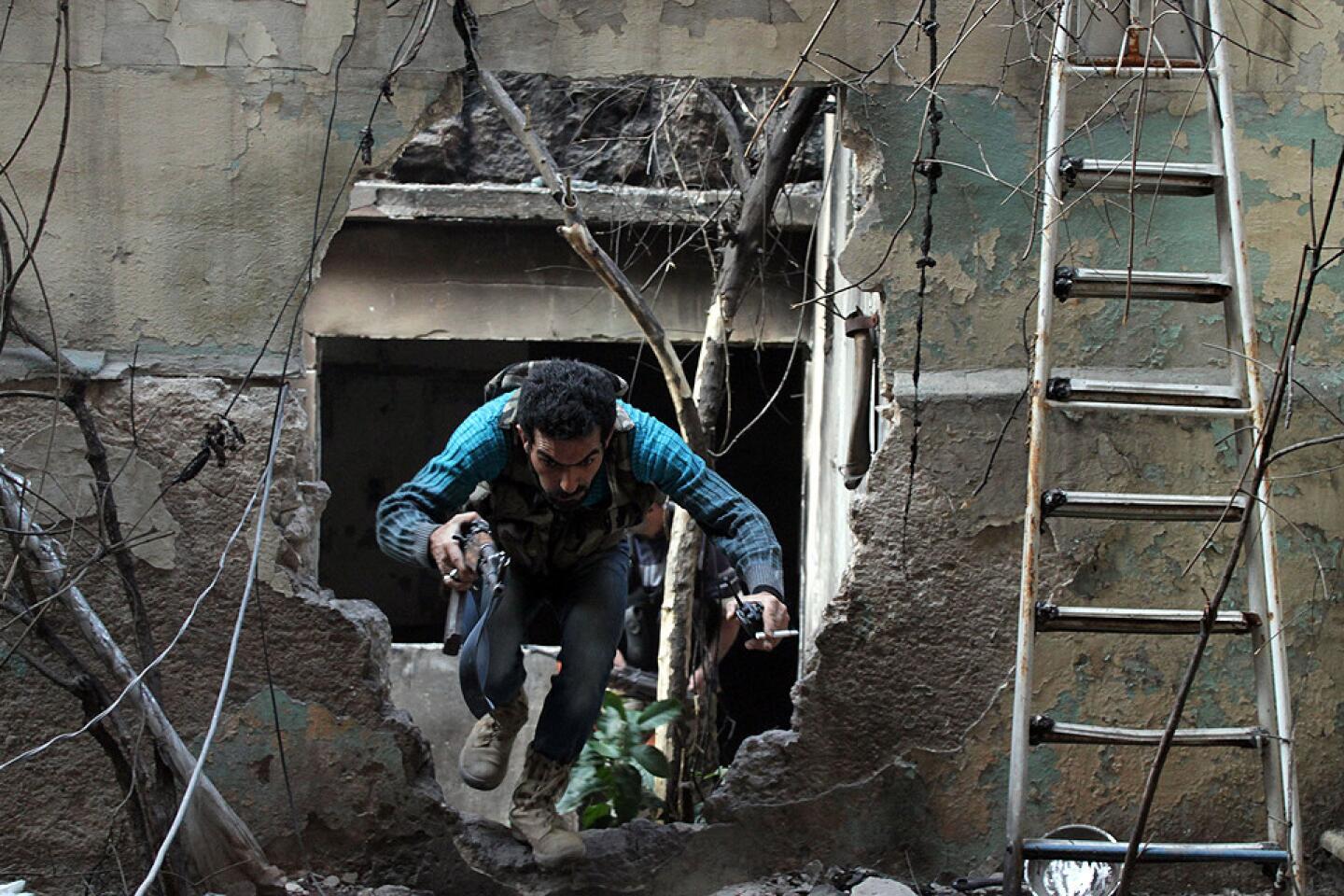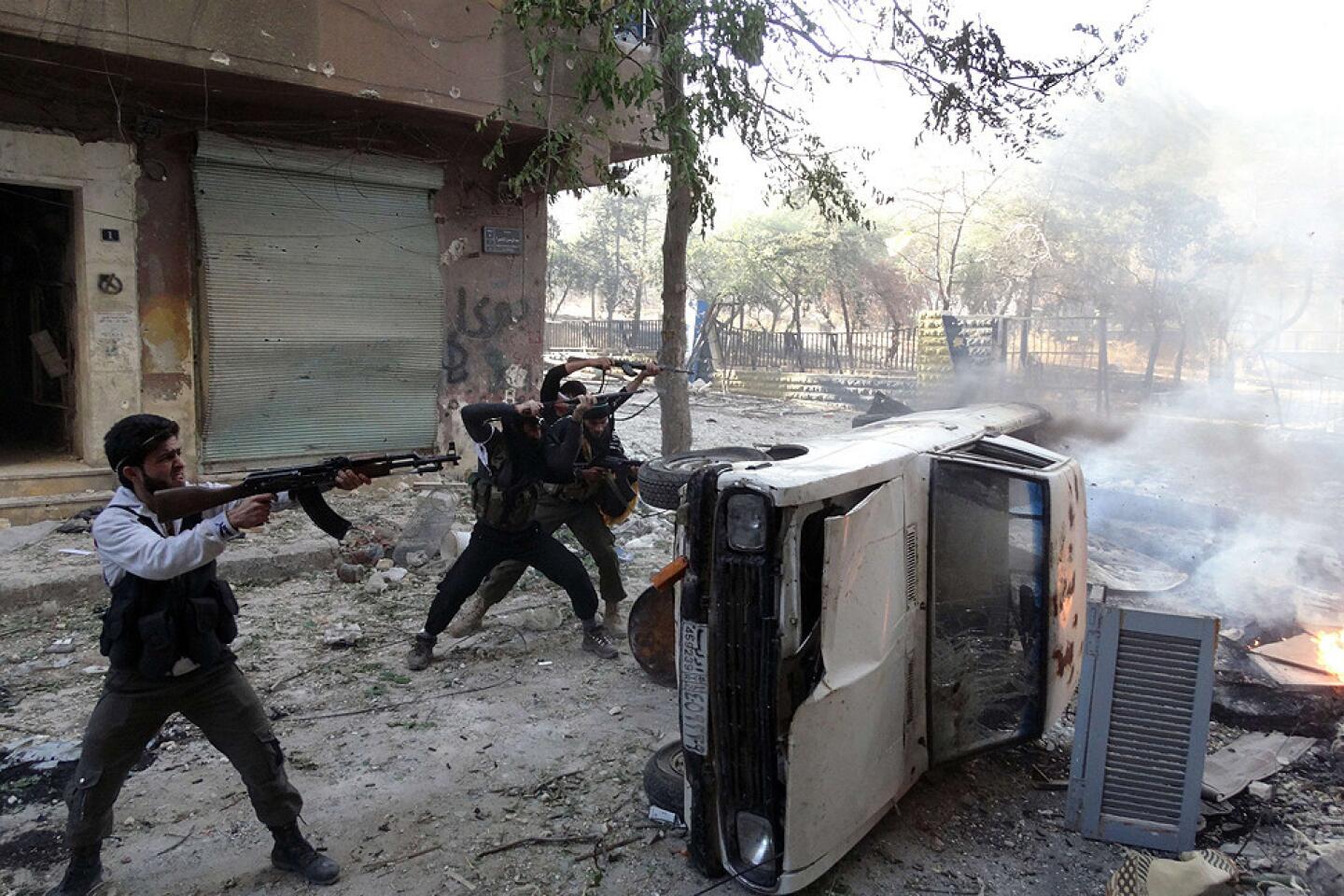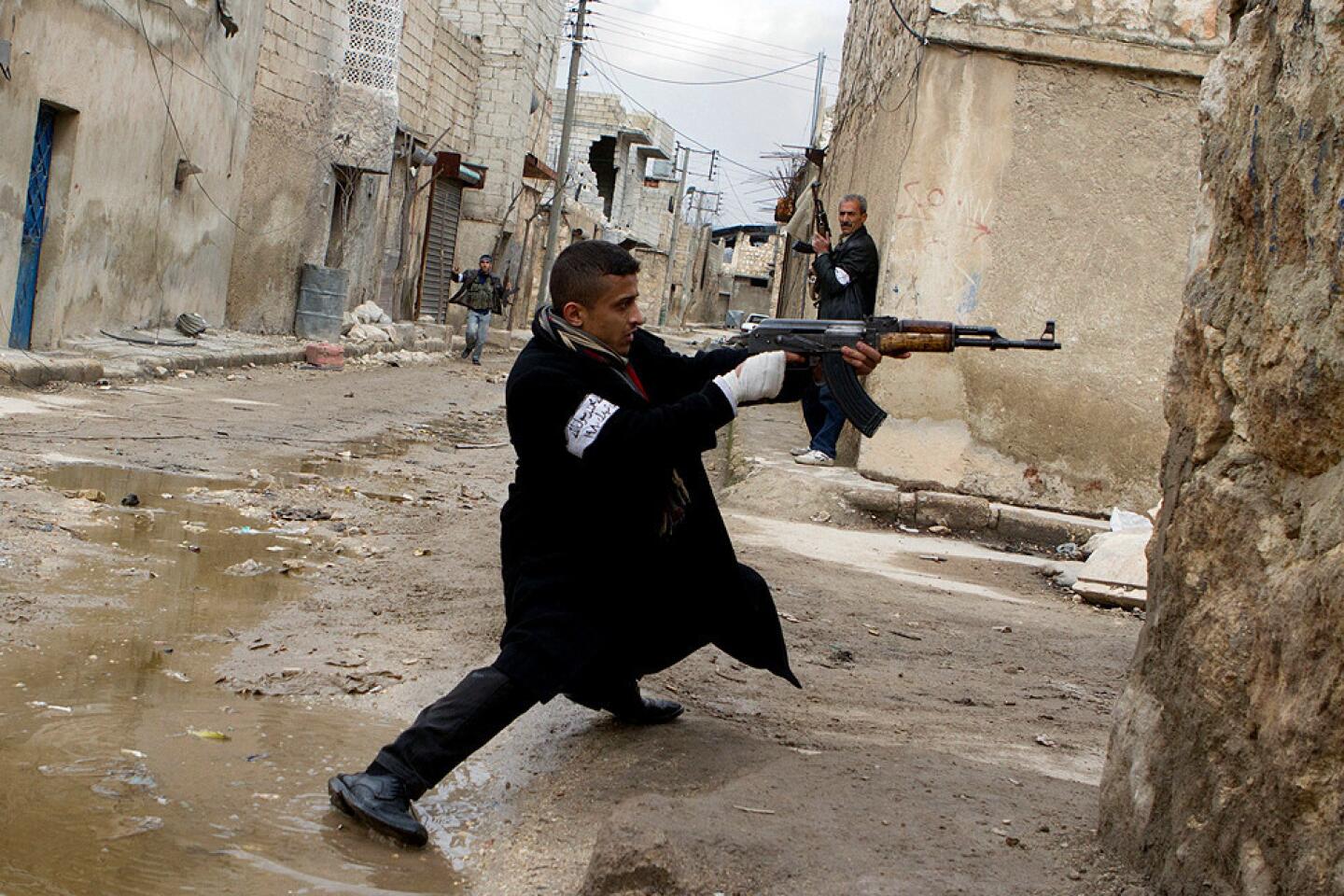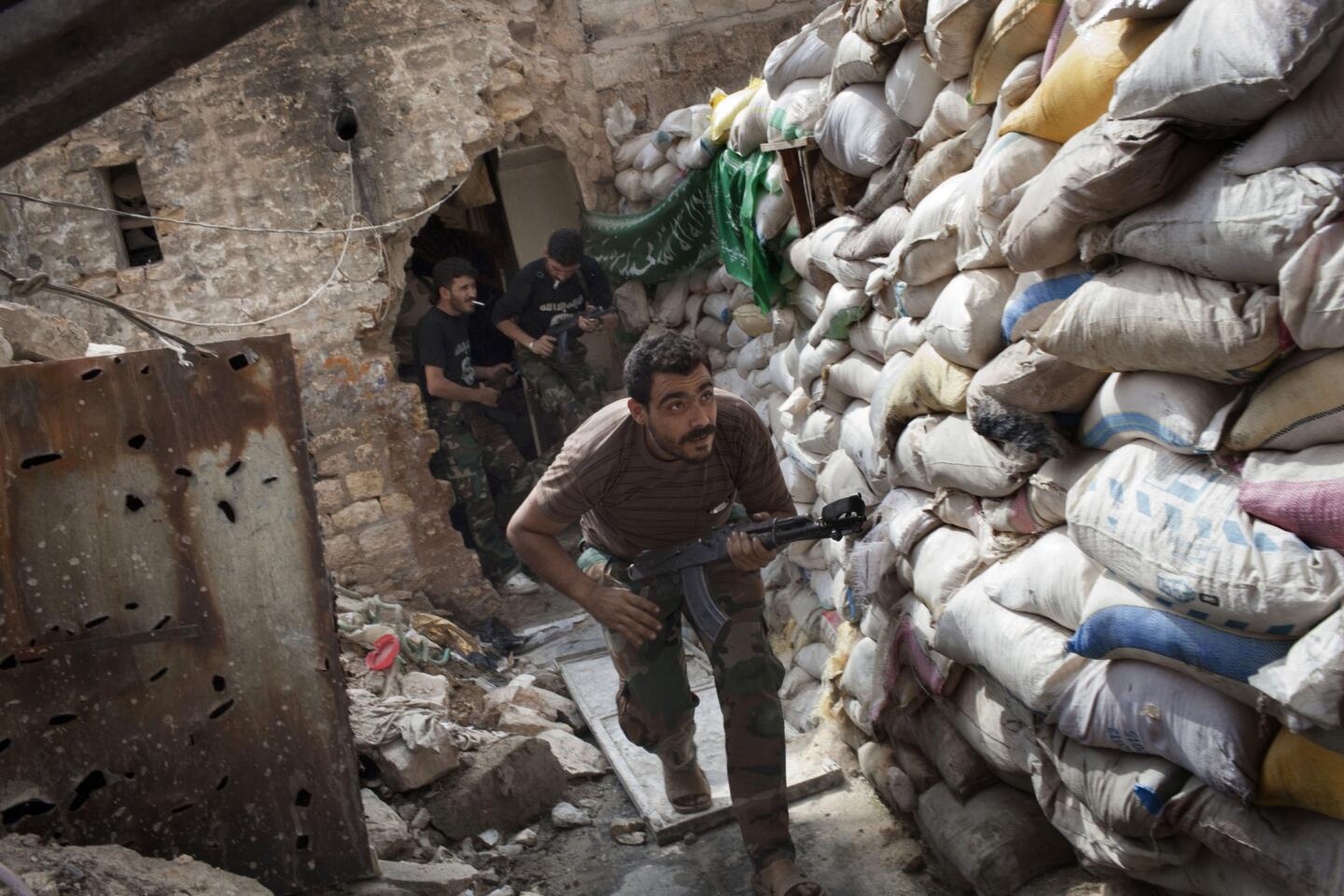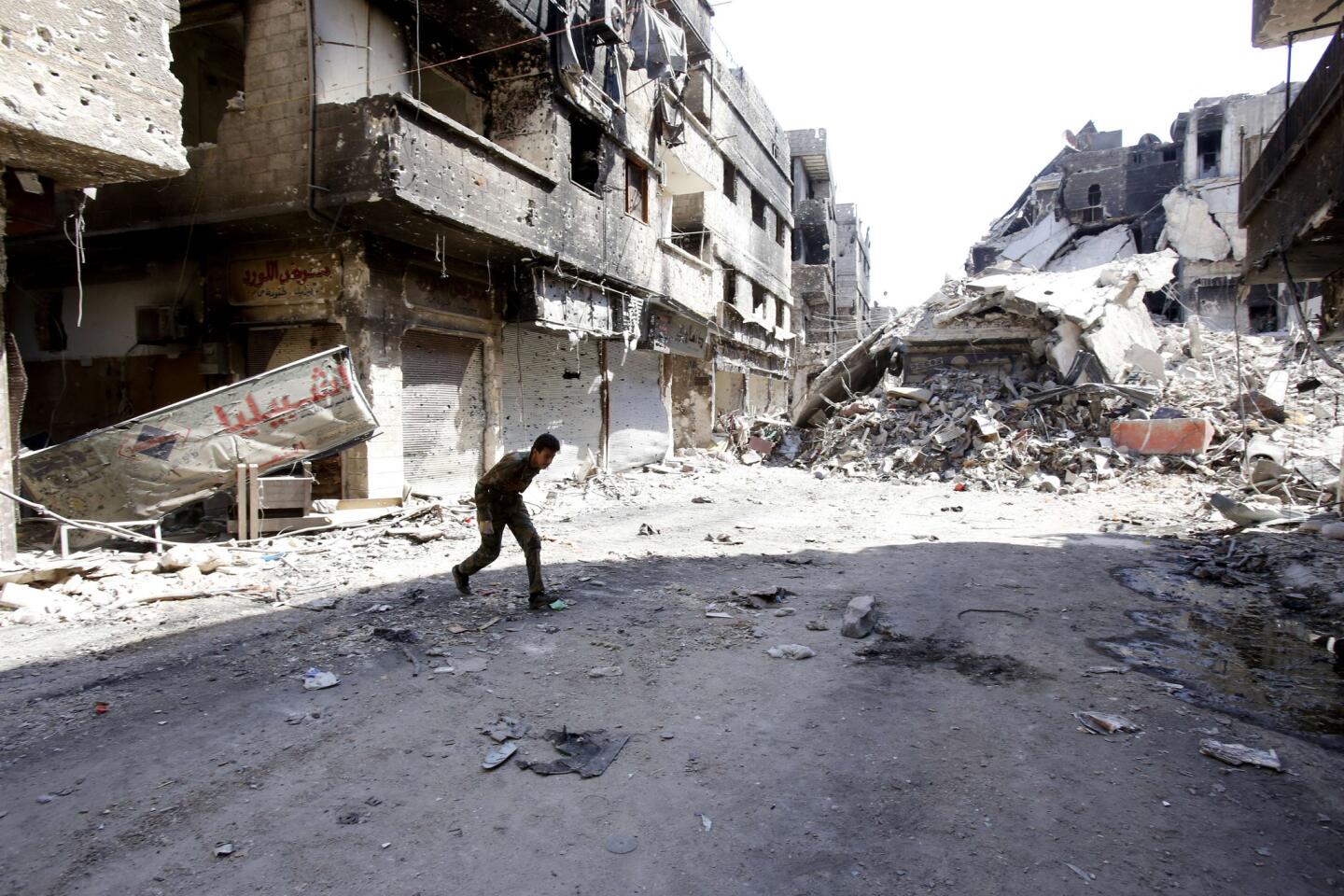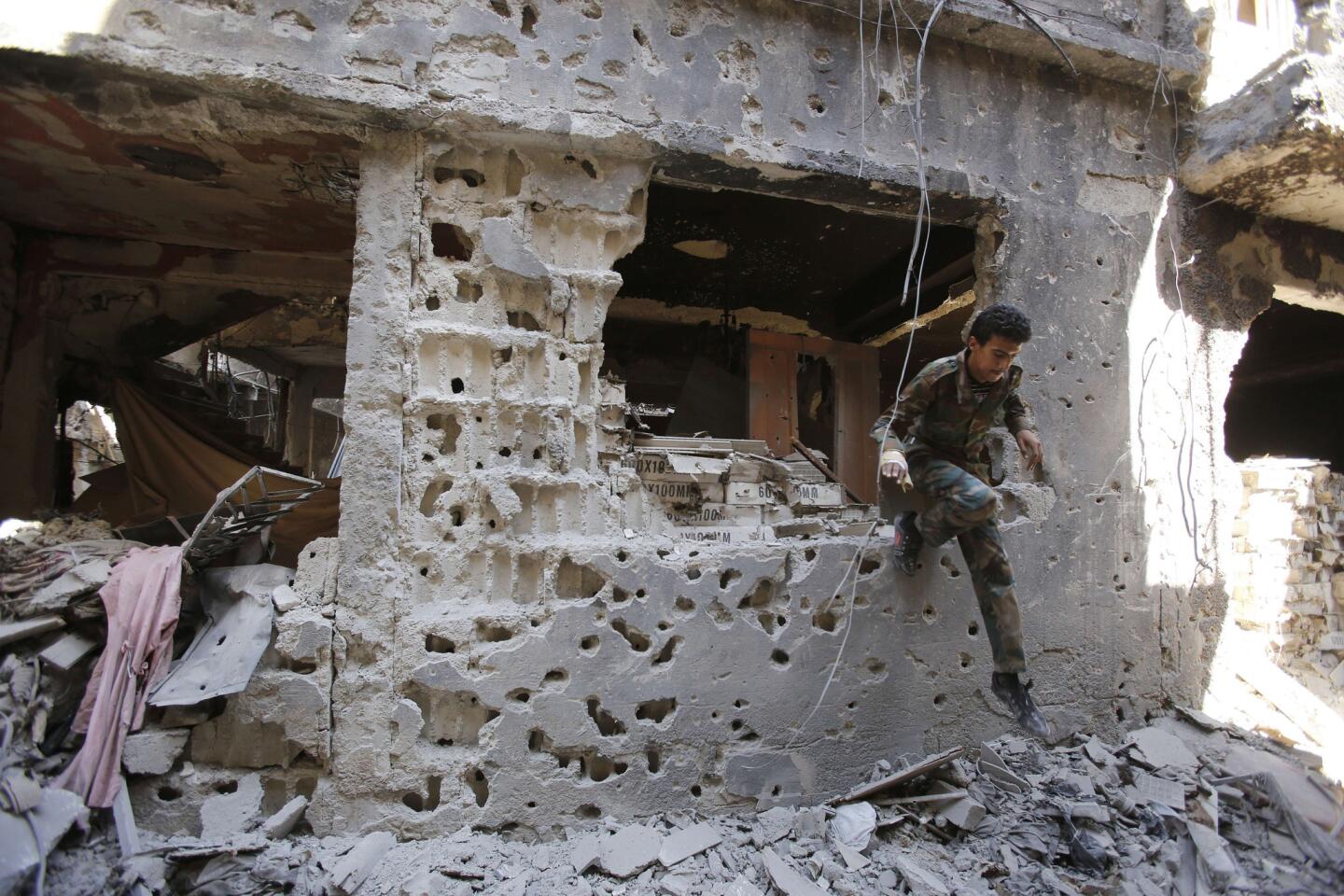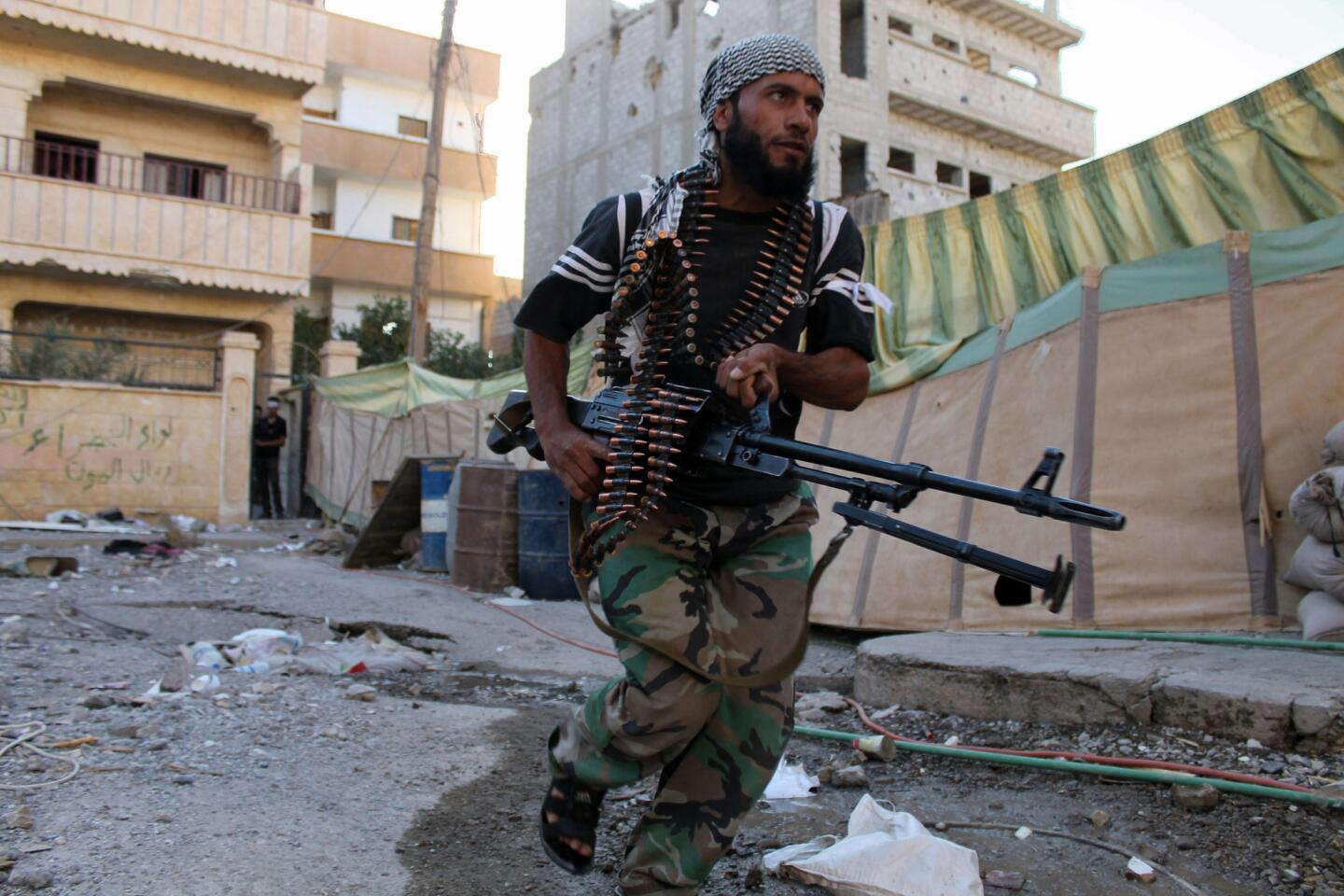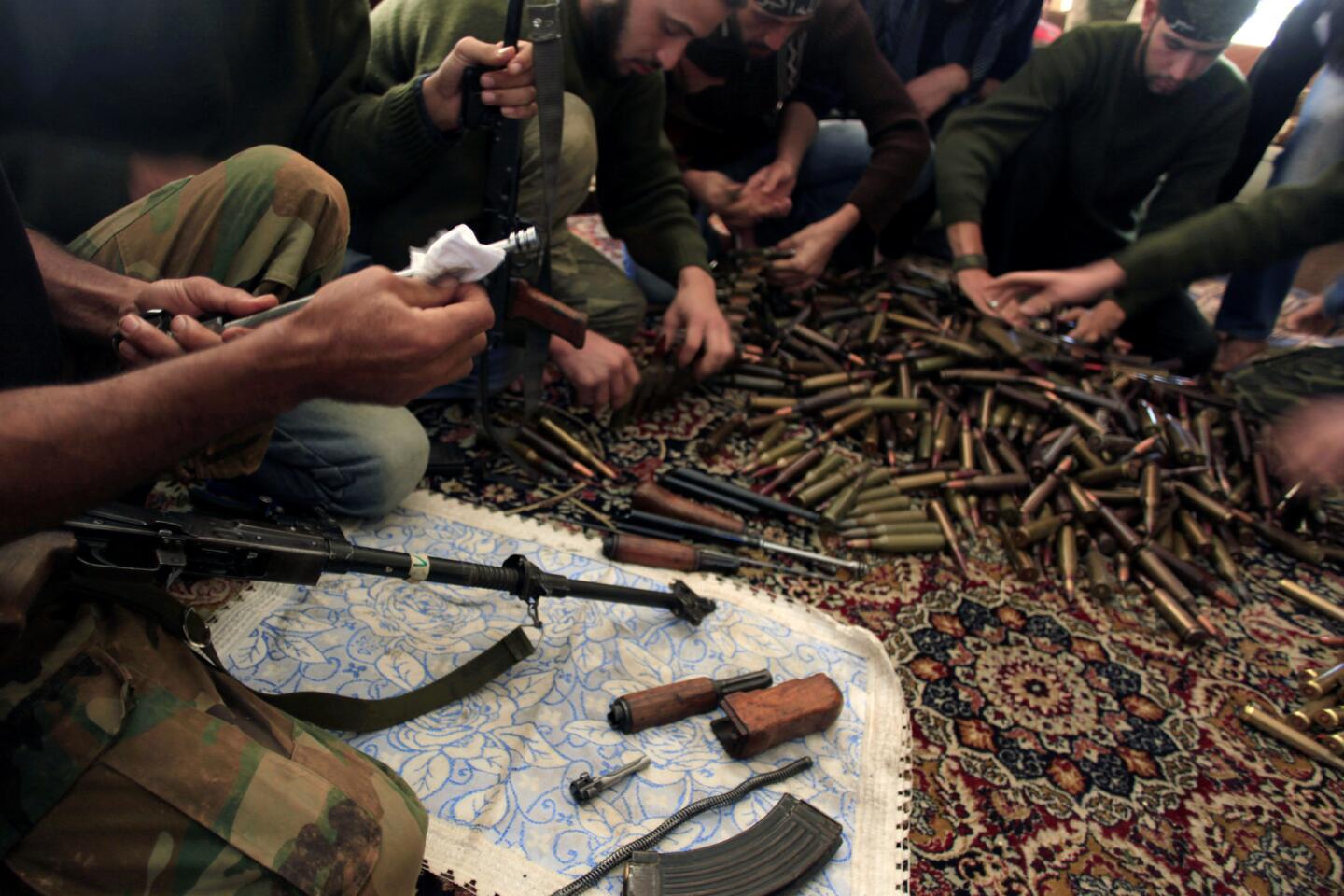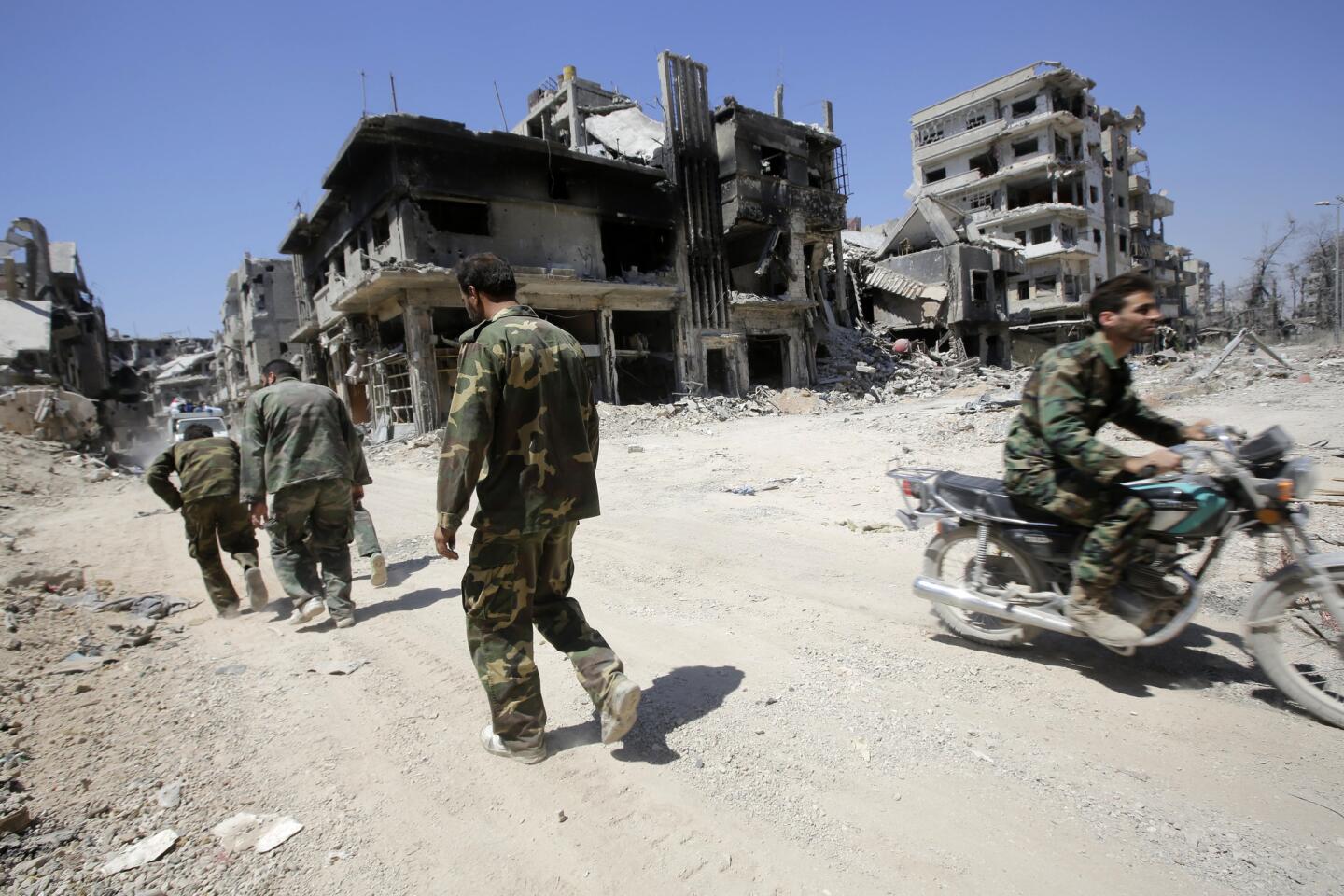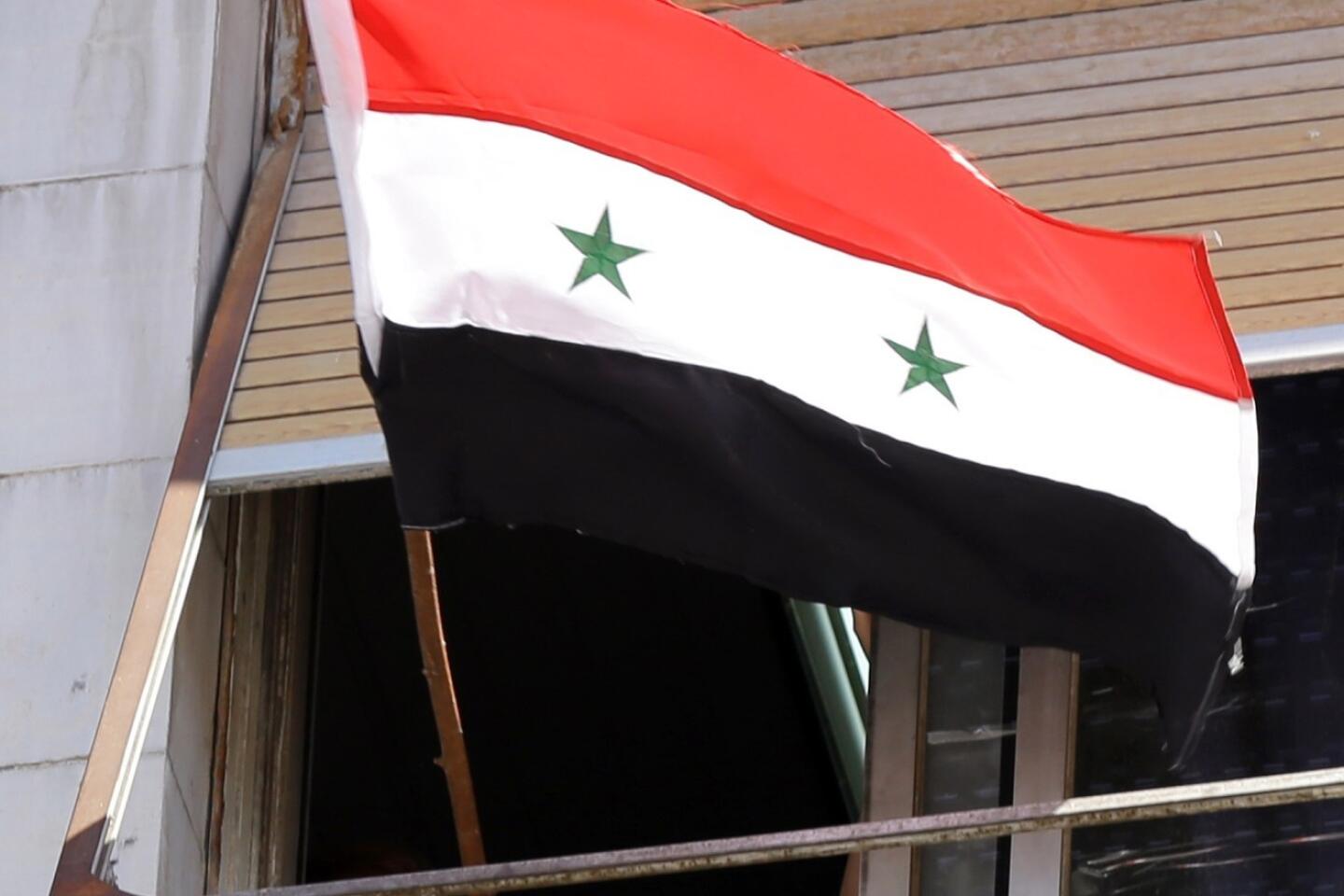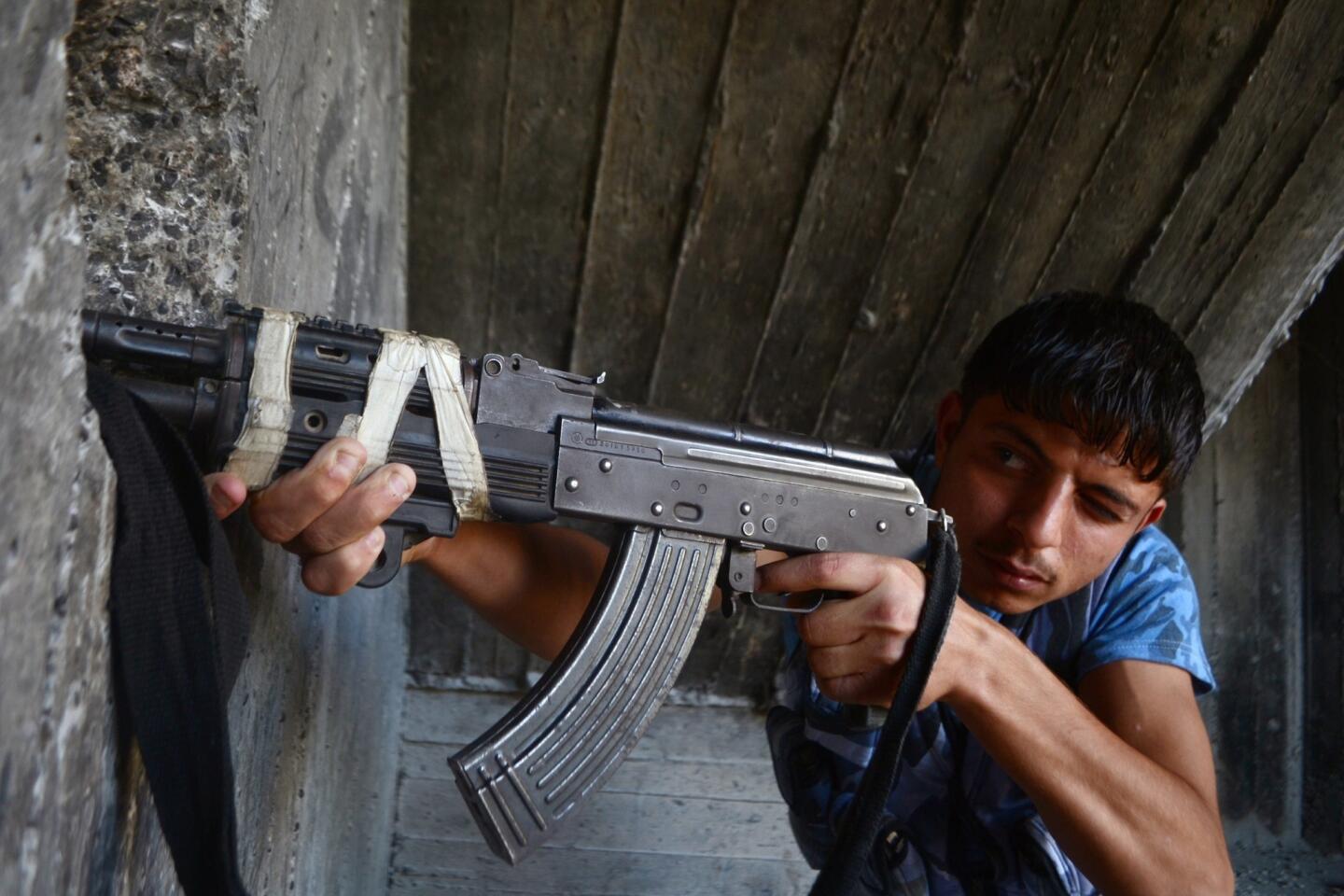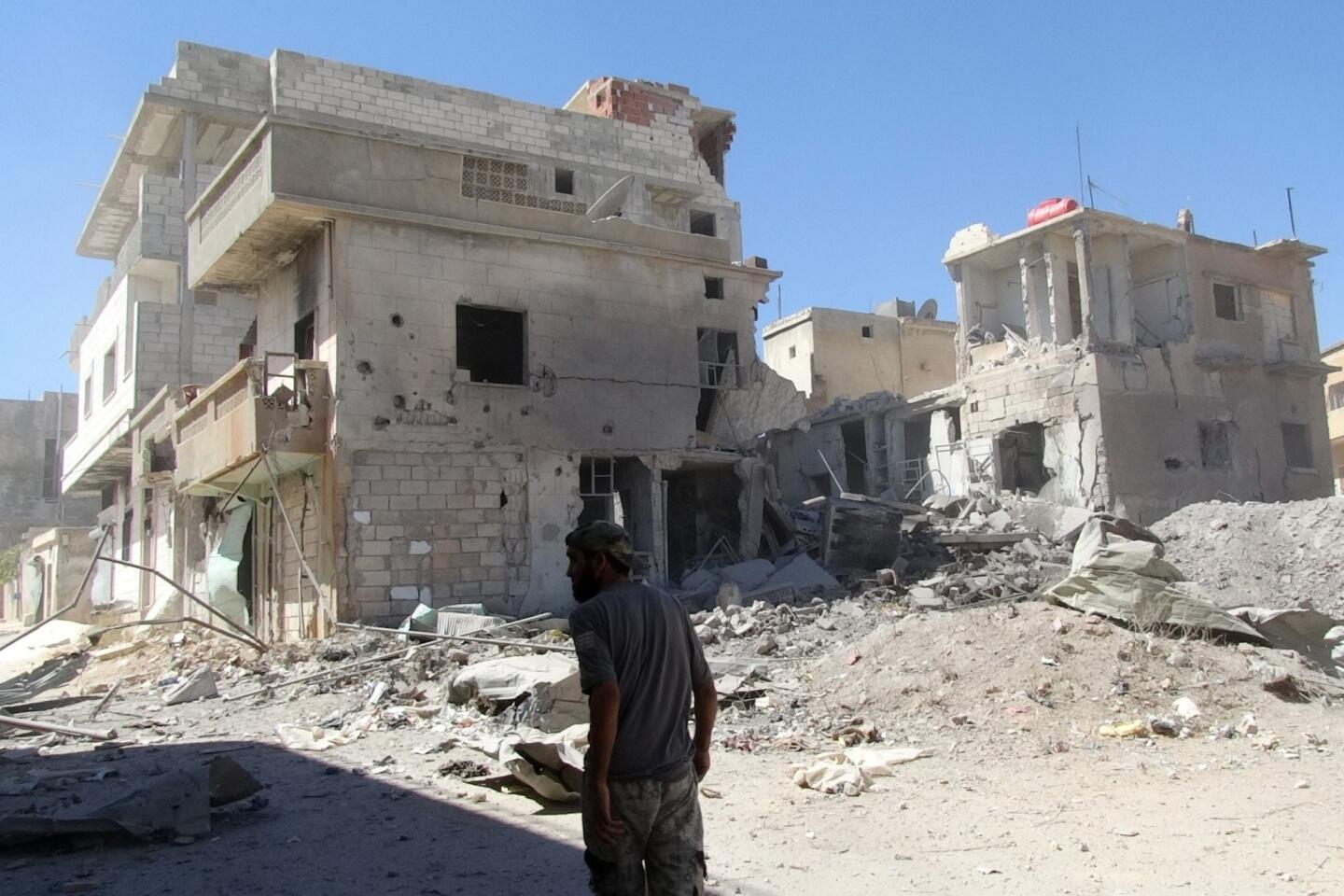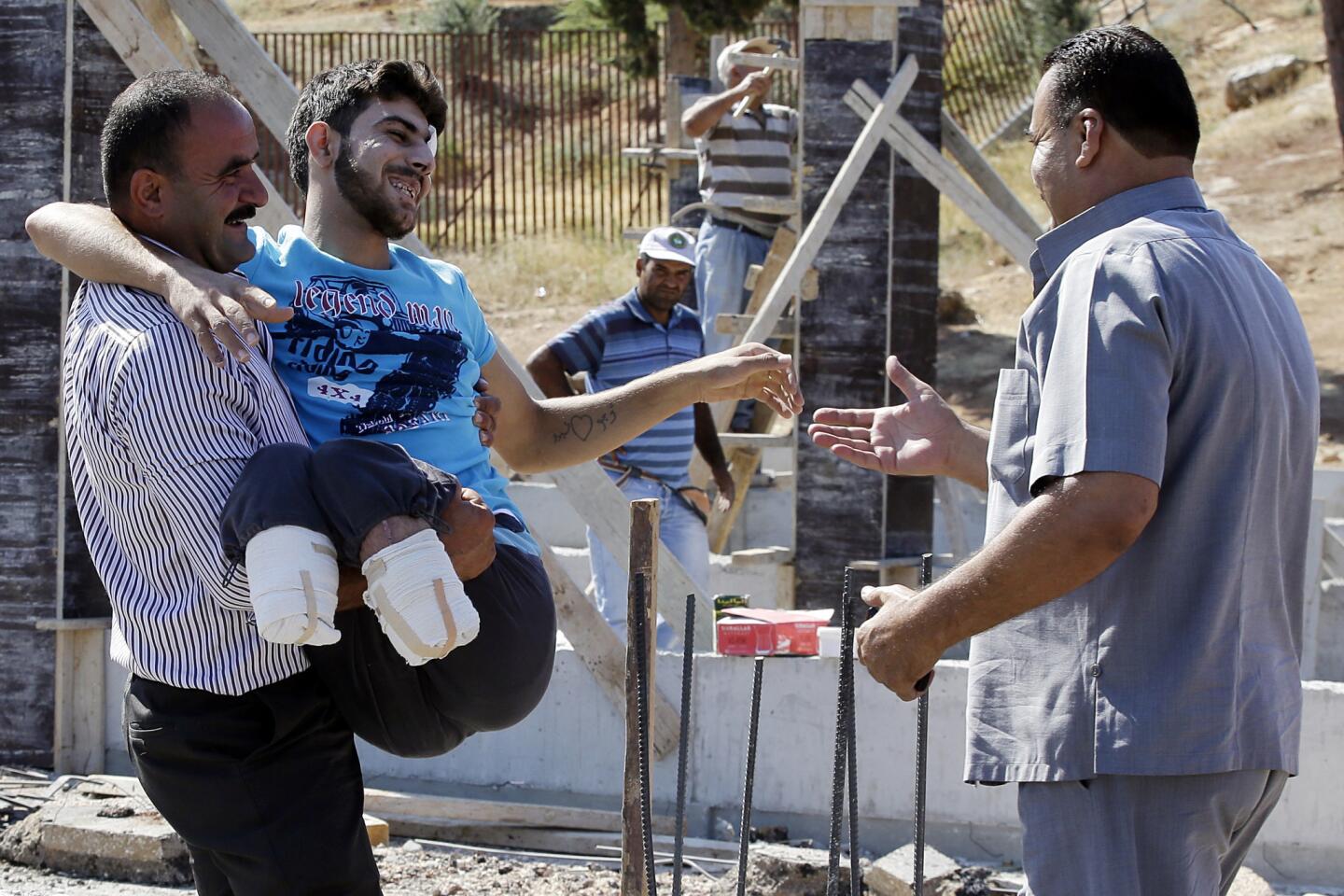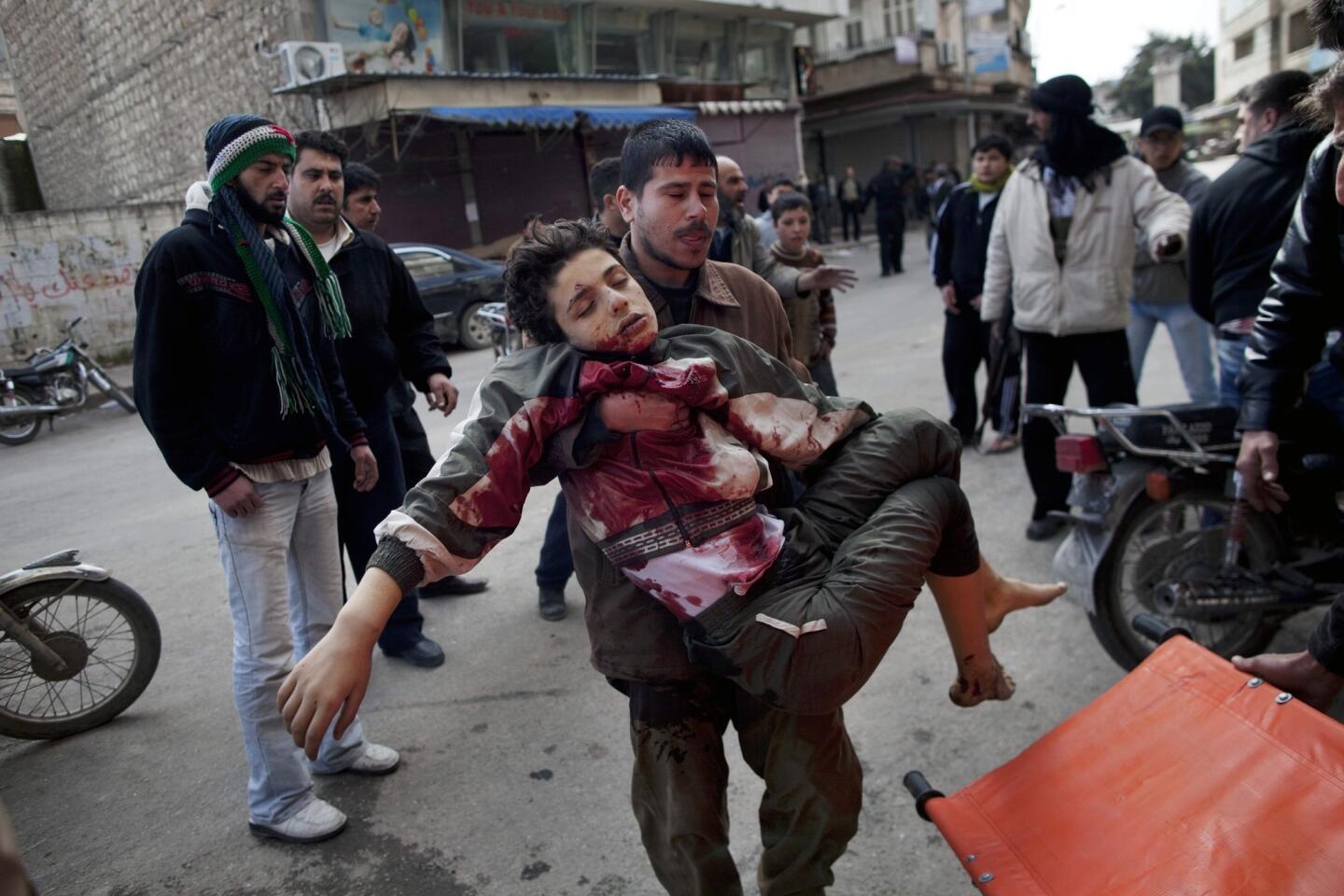Oft-repeated mantra in Damascus: ‘We’re tired of this’
- Share via
DAMASCUS, Syria — At a makeshift bus stop across from an expanse of bullet-riddled buildings, three elderly women stepped onto a packed van destined for the Syrian capital’s northeastern suburbs, neighborhoods largely under the sway of anti-government insurgents.
The trio faced hours of delays at army and rebel checkpoints — between patches of no man’s land and buffer zones under threat of fire — as they returned to their homes in Duma, a heavily contested town barely five miles away.
That morning, the women had made the four-hour-plus journey into the government-controlled city to shop and run a few errands, escaping the claustrophobic confines of Duma, where gasoline is scarce, cooking gas is a luxury, electricity is unavailable and prices have skyrocketed as essential supplies have been choked off.
“We’re tired of this,” said one of the women, a grandmother who gave her name as Um Yaman and clutched a bag of bread in one hand and a stack of personal documents in another. “We just want this to end and for everything to go back to where it was before.”
It’s an oft-repeated mantra in Damascus after more than two years of war between government forces and rebels seeking to oust President Bashar Assad. Residents are fed up with the constant negotiating of checkpoints and other barriers, the pervasive uncertainty and, of course, the lingering danger, highlighted by the frequent detonation of artillery and mortar rounds. No one knows how, or when, it will end.
Crossing front lines is especially problematic, but almost everyone faces monumental challenges of some kind, be they logistical, economic, personal or security-related.
Important decisions are postponed. People wonder whether to flee their homeland or stick it out and wait for an indeterminate denouement that could prove calamitous.
“My mother wants me to get married, but how can I get married in this situation?” asked Bassel, 30, a banker in the upscale Abu Rummaneh district who, like others interviewed, asked that only his first name be used for security reasons. “I can hardly be responsible for myself these days. How can I be responsible for a wife and children?”
Many have grappled with the dilemma of whether to remain or face an uncertain welcome abroad. With more than 2 million people now in exile, many nations are restricting the entry of Syrians or banning those who enter from working. As a result, economics can play a big role in deciding whether to stay.
“If you’re rich and can afford a nice apartment in Beirut , there’s no problem,” said a 27-year-old university graduate, who works for an international agency and has contemplated moving to neighboring Lebanon. “If you’re poor, well, maybe a refugee camp is not so bad. But if you’re in the middle, what do you do?”
Despite the prevalent sense of anxiety, life here appears mostly normal on the surface, including rush-hour traffic jams. People stick to the routines of going to work in the morning and returning home in the afternoons. Schools opened this month, sending clusters of exuberant children in blue smocks onto the streets and sidewalks. The ubiquitous presence of soldiers and armed militiamen at checkpoints and elsewhere is often the only outward sign that warfare is raging just outside the city limits.
In the bustling Hejaz area downtown, however, the stately, century-old-plus train station appears forlorn. Syria’s trains have long stopped running — victims of insurgent sabotage and attacks — and a station that stood as a lovingly restored monument to a once-celebrated rail line has now become a memorial for 132 railroad employees killed, many more injured and 60 kidnapped across the nation. Plaques inside the station commemorate the fallen railroad workers. The destruction is part of the tens of billions of dollars in damage inflicted on Syria’s infrastructure.
“It’s sad: I don’t understand why in order to bring down a regime you have to destroy the railroad and burn trains that we purchased brand new from China,” said Younes Nasser, public relations manager for the Hejaz Railroad, as he stood on the station balcony overlooking the square and a century-old German-made caboose on display outside.
Armed militiamen guard the shuttered station, its intricate interior woodwork and brass chandelier now invisible to Damascenes with more weighty matters on their minds.
“Public transport is the nerve center of the country,” Nasser said. “Now it is all destroyed.”
Across town, in the mostly Christian Qassa district, garlands of white flowers were strung along the pews and columns of Holy Cross Church the other day in preparation for a wedding. The smartly dressed guests and families of the bride and groom gathered outside, awaiting the moment when the couple would arrive and approach the altar.
“Our lives go on,” said Greek Orthodox Bishop Isaac Barakaat, seated in his office adjacent to the church. “We are in our third year living with this.”
The nation’s Christian community, like other Syrian minorities, is deeply worried about a possible Islamist takeover of Syria, one of the most ethnically and religiously diverse nations in the Middle East, and one with a tradition of religious tolerance. There is profound concern here for the fate of Maaloula, a landmark Christian town north of the capital that is home to several historic churches and the renowned St. Thecla monastery, residence for a community of nuns.
Rebel fighters, including Sunni militants with the Al Qaeda-linked Al Nusra Front, overran Maaloula this month. Fierce clashes continue as government forces try to retake the community. Residents have relocated to Christian areas of Damascus, including Holy Cross parish.
“We all know what happened in Iraq,” Barakaat said, referring to the mass exodus of Christians from the neighboring nation after the U.S.-led invasion in 2003 that toppled President Saddam Hussein. “We are Syrians. We have lived with our Muslim brothers for more than 1,000 years. Maybe if the terrorists come things will be worse. But we have God.”
For now, the fate of Syria appears to be largely in the hands of non-divine outside powers, notably Russia and the United States, each backing and arming opposing sides in the civil war. Although the two major powers have orchestrated a deal to eliminate Syria’s chemical weapons, there is still much bickering about terms of a prospective peace process that appears illusory in Damascus.
For many Syrians, it is infuriating that their destiny appears tied so closely to decisions made in Moscow and Washington, based on geostrategic concerns far removed from people’s daily lives.
“This is a great game for Russia and America,” Barakaat said. “We Syrians are caught in the middle.”
Special correspondent Nabih Bulos contributed to this report.
More to Read
Sign up for Essential California
The most important California stories and recommendations in your inbox every morning.
You may occasionally receive promotional content from the Los Angeles Times.
